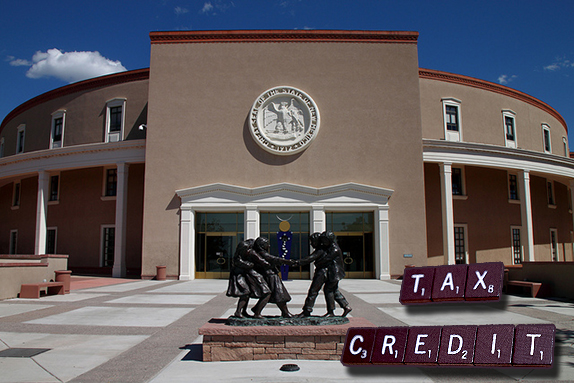
New Mexico lawmakers have at their disposal an effective tool for helping the working families in our state who need it most. The Working Families Tax Credit (WFTC)—a credit based on the federal Earned Income Tax Credit (EITC)—goes to low- and moderate-income families that work, helping them meet their basic needs. Increasing the credit would do so much for these families struggling to get by on low wages, and there’s a way to pay for the increase that actually helps restore a little bit of fairness to our tax system.
Along with the federal credit, the WFTC helps families keep working despite low wages. In fact, it encourages those with the lowest earnings to work more hours, since the value of the credit increases as their earnings go up. The WFTC helps to reduce the substantial state and local taxes paid by low-income families, and these families actually pay a larger share of their income in taxes than do higher income households. In fact, those in the bottom 40 percent of the income scale pay around 10 percent or more of their income in state and local taxes. Those at the top with incomes above about $300,000 pay under 5 percent in state and local taxes. With such an upside-down tax system it’s no wonder income inequality is so high in New Mexico.
By reducing their taxes, the WFTC lets low-income working families in our state keep more of what they earn. That income boost not only helps them to make ends meet but also can improve their children’s lot in life. Research shows that an income boost like the one families get through the federal EITC plus our WFTC helps children do better and go farther in school. It also helps them work and earn more as adults. That’s good for all of New Mexico because it helps families get on their feet, reduces their need for public assistance, and helps stop the vicious cycle of poverty that holds back so many children.
Many lawmakers support an increase in the WFTC but they’ve also asked how we’ll pay for it. It turns out that there’s a way to fund the increase while also helping to right some of the wrong in our tax code. We can raise the money by repealing a tax break called the capital gains deduction that reduces the income taxes that are paid mostly by our very wealthiest households. Currently, New Mexicans with capital gains income—that’s income from the profitable sale of assets like stocks, bonds, and real estate—can deduct half of that income from their state income tax bill. Not surprisingly, almost 90 percent of this income goes to just 10 percent of New Mexicans—those at the top of the income scale. Half of all capital gains go to New Mexicans with incomes of half-a-million or more, yet these folks are not asked to pay taxes on the full amount of that income.
Closing this deduction would yield more than enough to pay for an increase in the WFTC. And those dollars would end up in the pockets of the New Mexicans most likely to spend it, giving a boost to local businesses and local economies as families go out and get their cars repaired, pay for child care, or pay bills.
The capital gains deduction is an expensive and wasteful tax break that makes our tax system less fair and we get little for it. It does nothing to get families working, reduce poverty or brighten children’s futures, and it doesn’t help our economy. It’s time to reevaluate tax breaks that benefit those at the top and leave the lowest-earning New Mexicans paying more of their income in taxes than the highest-income New Mexicans. And it’s time to do more for working families earning low wages. The WFTC provides the perfect tool to do just that.



Responses to “Tax Credit Increase for Low-Income Working Families Would Increase Tax Fairness”